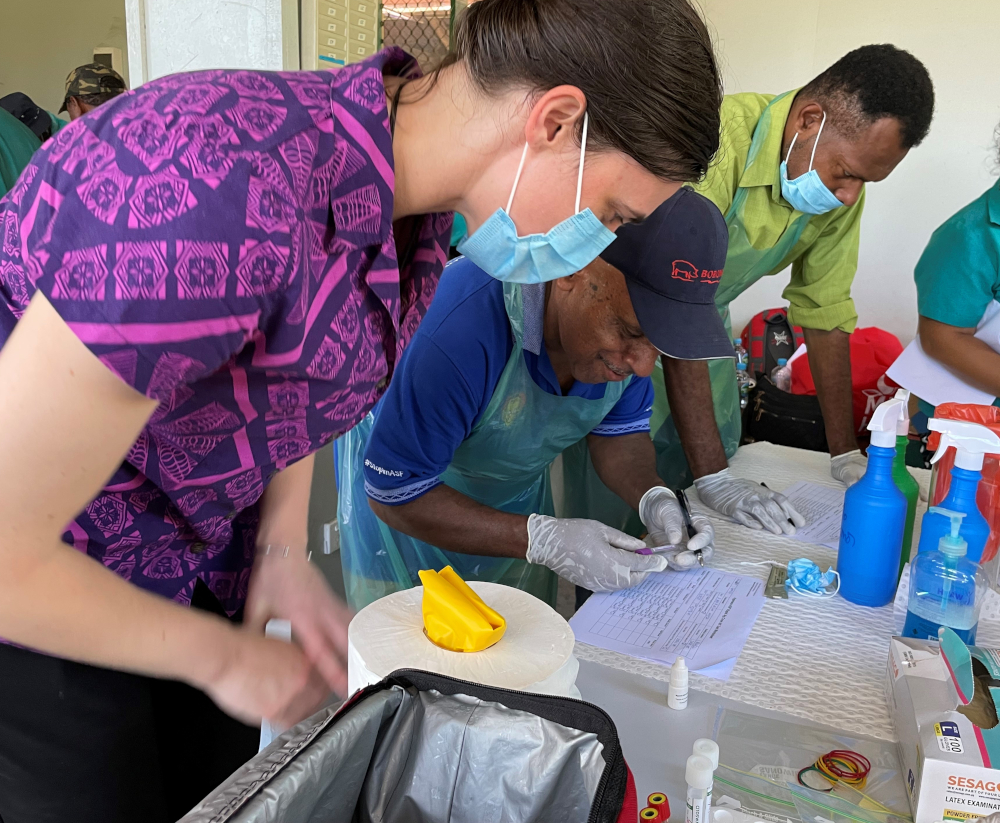 Australian agriculture benefits significantly from the absence of several high-impact diseases. Many of these diseases are present in our region and, in some cases, in near-neighbour countries.
Australian agriculture benefits significantly from the absence of several high-impact diseases. Many of these diseases are present in our region and, in some cases, in near-neighbour countries.
Ensuring our regional partners have the capability to detect and control these diseases significantly reduces the risk of them reaching our shores. It also leads to positive impacts on food security in affected countries.
The International program at CSIRO's Australian Centre for Disease Preparedness (ACDP) has always had a strong presence in the region, helping to improve health outcomes for animals and humans both in Australia and the Indo-Pacific region.
What we do
Laboratory capacity building
- We provide guidance in diagnostics and training in new laboratory methodologies.
- We strengthen diagnostic networking and surveillance systems which improves emerging and endemic disease management.
- With improved networking, laboratories contribute to broader health security systems through increased information sharing.
Direct bilateral support
- We provide on the ground training in disease surveillance techniques and laboratory diagnosis.
- We provide diagnostic kits for priority animal diseases like Foot and Mouth Disease, Lumpy Skin Disease, African swine fever and avian influenza.
- We run proficiency training programs for these priority livestock diseases.
Biorisk management training
- We are international leaders in biorisk and biosafety management.
- We aim to strengthen biorisk management skills of laboratory workforces in Asia-Pacific.
- Through establishment of a biorisk community of practice, regional laboratory networks are strengthened.
Our online training courses
We have developed a number of training courses that are available online.
Click the button below to see our course catalogue and instructions on how to register and enrol.
Our projects
- Pacific networked diagnostics and support (PaNDAS)
- Asia-Pacific placements and laboratory leadership (APPLLe)
- Wildlife interface viromic regional emerging infectious disease surveillance (WIViREIDS)
- Regional biorisk management training (R-BMT)
- Bilateral laboratory collaboration (BICOLLAB II)
- Regional emerging disease support project (REDS)
- Partnership with Indonesia's animal health laboratory
- Strengthening PNG against animal diseases
- Keeping track of avian influenza
Read our latest news and stories
Australian agriculture benefits significantly from the absence of several high-impact diseases. Many of these diseases are present in our region and, in some cases, in near-neighbour countries.
Ensuring our regional partners have the capability to detect and control these diseases significantly reduces the risk of them reaching our shores. It also leads to positive impacts on food security in affected countries.
The International program at CSIRO's Australian Centre for Disease Preparedness (ACDP) has always had a strong presence in the region, helping to improve health outcomes for animals and humans both in Australia and the Indo-Pacific region.
What we do
Laboratory capacity building
- We provide guidance in diagnostics and training in new laboratory methodologies.
- We strengthen diagnostic networking and surveillance systems which improves emerging and endemic disease management.
- With improved networking, laboratories contribute to broader health security systems through increased information sharing.
Direct bilateral support
- We provide on the ground training in disease surveillance techniques and laboratory diagnosis.
- We provide diagnostic kits for priority animal diseases like Foot and Mouth Disease, Lumpy Skin Disease, African swine fever and avian influenza.
- We run proficiency training programs for these priority livestock diseases.
Biorisk management training
- We are international leaders in biorisk and biosafety management.
- We aim to strengthen biorisk management skills of laboratory workforces in Asia-Pacific.
- Through establishment of a biorisk community of practice, regional laboratory networks are strengthened.
Our online training courses
We have developed a number of training courses that are available online.
Click the button below to see our course catalogue and instructions on how to register and enrol.
Our projects
- Pacific networked diagnostics and support (PaNDAS)
- Asia-Pacific placements and laboratory leadership (APPLLe)
- Wildlife interface viromic regional emerging infectious disease surveillance (WIViREIDS)
- Regional biorisk management training (R-BMT)
- Bilateral laboratory collaboration (BICOLLAB II)
- Regional emerging disease support project (REDS)
- Partnership with Indonesia's animal health laboratory
- Strengthening PNG against animal diseases
- Keeping track of avian influenza
